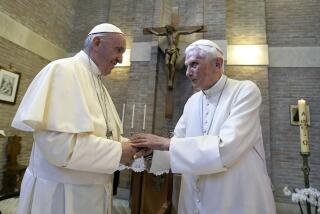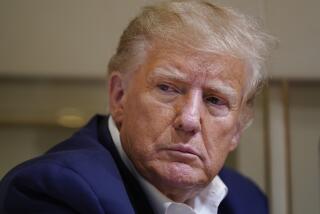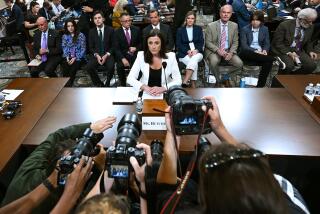McFarlane Admits False Statements : Defends Reagan’s Motives, Says He Acted to Protect His Own Reputation
- Share via
WASHINGTON — Former National Security Adviser Robert C. McFarlane, in his second day of testimony before a House-Senate panel investigating the Iran- contra scandal, acknowledged Tuesday that he made false statements to both Atty. Gen. Edwin Meese III and Congress about important elements of the affair.
McFarlane, who will testify again today, said he acted strictly to protect himself--”my reputation and my record of performance”--and not to cover up any wrongdoing by the President.
” . . . President Reagan’s motives and direction to his subordinates throughout this enterprise has always been in keeping with the law and national values,” he said. “I don’t think he is at fault here, and if anybody is, I am.”
Blames ‘Dim’ Memory
McFarlane blamed a “very, very dim” memory of events for numerous discrepancies between his version of what occurred and records of official communications that reflect his thoughts and knowledge at the time.
However, some of the conflicting evidence brought forward by House counsel John W. Nields Jr. indicated that McFarlane and other key National Security Council officials attempted to hide some of the most politically explosive and legally sensitive aspects of the early deals shortly after the arms sales became public last November.
Other evidence showed that while McFarlane, as the President’s top national security aide, was vigorously assuring Congress in 1985 that the Administration was not violating the ban then in effect on government aid to the Nicaraguan rebels, he was quite familiar with extensive efforts by his aide, Lt. Col. Oliver L. North, to arrange financial and military support for them. McFarlane was on the President’s staff until December, 1985.
At one point, McFarlane told the committee that he tried to withhold from Congress sensitive records of possibly illegal Administration activities on behalf of the rebels--and even ordered North to rewrite the records--because allowing lawmakers to see them might lead to “an extremely tortuous, conflicting, disagreeable outcome.”
He said: “ . . . I hoped we wouldn’t come to that. . . . It would become, or could become, from the political point of view, quite an embarrassing thing.”
Compared Records
Most of the inconsistencies were found by comparing records of interoffice computer messages between McFarlane and his aides with the statements the former national security adviser made to various officials investigating the affair.
Among those investigators was Meese, whom Reagan had assigned last November to get to the bottom of a controversy that was threatening to engulf his Administration.
At the same time Meese was conducting his inquiry, White House officials were drafting a chronology to serve as the Administration’s official record of the sales. Documents showed that its writers, including McFarlane, deleted references in the chronology to Reagan giving approval to Israel to make the first shipment of U.S. arms to Iran in August, 1985.
The issue of when the President approved the arms shipments is especially sensitive, because many--including Defense Secretary Caspar W. Weinberger and top CIA officials--had raised questions about the legality of knowingly shipping or allowing the sale of U.S. weapons without an official, written presidential “finding.” That approval was not signed until Jan. 17, 1986, well after two such sales by the Israelis had been completed.
They also changed the chronology to indicate that the Administration had been duped into believing that a November, 1985, shipment of HAWK missiles by Israel--a shipment that the U.S. government had helped Israel make--was actually a delivery of oil-drilling parts. In fact, McFarlane and other officials were well aware at the time of its true contents.
McFarlane offered the same false account about oil-field equipment when first questioned by Meese about the shipment last November. However, he subsequently discovered that the attorney general had been informed of the true nature of the cargo by Secretary of State George P. Shultz.
‘Peripheral Mention’
“I mentioned that I had heard of some peripheral mention of oil parts perhaps being tried, that I wasn’t sure that they were in fact shipped then,” McFarlane recalled telling Meese last November. “But then finally, when he mentioned to me, ‘George Shultz has contemporaneous notes that he says you talked to him about the HAWKS,’ . . . I said, ‘I can understand that, and I’ll accept it, but I have no clear recollection of it.’ ”
Without disguising his incredulity, Nields asked: “So, you’re saying that after a week of working on these chronologies--which moved from a version in which it was clearly stated that HAWK missiles had been transported in November of 1985, to a version which you then passed on to the attorney general, that we were told that it was oil-drilling equipment--throughout that week, you never remembered that you had known in November of 1985 that HAWK missiles were being shipped?”
McFarlane continued to insist that he was not closely involved in drafting the versions of the official chronology and therefore it had not jogged his memory about what he knew at the time.
However, Nields produced records of computer messages that indicated that McFarlane himself had drafted changes making it appear that Reagan had opposed the Israeli shipments. McFarlane had also suggested substituting “transfers of equipment” for earlier references to “the Israeli delivery of HAWK missiles,” the messages showed.
McFarlane said he remembered that he made the suggestions to prevent North from making more radical changes to the initial draft.
McFarlane said repeatedly that he would “accept” the investigators’ interpretations that he misled other officials about the operation. But in most instances he insisted that he could not remember willfully doing so. He also offered numerous times to “accept responsibility for what happened, whether I knew it or not.”
At one point, he added: “I am told I should be as supplicatory as I can.”
Lawmakers investigating the scandal, particularly the House Republicans who have defended Reagan’s foreign policy most vigorously on Capitol Hill, have said privately that they are bitter over being misled by McFarlane when they repeatedly inquired over the last few years into Administration activities on behalf of the contras.
That anger showed in the long and tortuous line of questioning McFarlane faced about his failure to fully answer repeated congressional inquiries.
‘Problematic’ Papers
Nields noted that in 1985, records show that McFarlane had separated six “problematic” documents--detailing various aspects of support that the NSC staff was offering the contras--from material that the White House was considering providing to former Rep. Michael D. Barnes (D-Md.). Barnes was then the chairman of the House Foreign Affairs Western Hemisphere subcommittee, and a leading critic of Administration policy in Central America.
McFarlane on Tuesday described the documents as revealing “infractions of law” involving aid for the contras.
One of those records, for example, was a message from North suggesting to McFarlane that Guatemala be given military aid as a reward for “the extraordinary assistance they are providing to the Nicaraguan freedom fighters,” particularly for Guatemala’s willingness to provide phony documents that concealed a shipment of almost $8 million in ammunition to the contras. (McFarlane insisted that he favored aid to Guatemala, regardless of its role in supplying the rebels.)
McFarlane acknowledged that he ordered North to rewrite the documents but indicated that the rewritten version never was made a part of the official files.
Cites Compliance
In answer to Barnes’ 1985 queries about NSC activities in support of the contras, McFarlane offered assurances in a Sept. 12, 1985, letter that “my actions, and those of my staff, have been in compliance with both the spirit and the letter of the law.”
He made similar assertions to Rep. Lee H. Hamilton (D-Ind.), who was then chairman of the House Intelligence Committee and who now chairs the House select committee investigating the Iran-contra affair.
With each day’s testimony, listeners get an increasingly vivid portrait of North, the gung-ho Marine colonel whose actions were at the heart of the Iran-contra scandal. On Tuesday, McFarlane said that while North failed to keep him informed of key aspects of the Iran-contra operation, the colonel frequently reported to the late CIA Director William J. Casey.
Whenever McFarlane was asked to explain memos written by North suggesting that legal corners had been cut to provide help for the contras, McFarlane dismissed the memos as North’s typical, “lurid” way of expressing himself. He said that he had learned to dismiss “this kind of, oh, Rabelaisian cast to messages and . . . the creation of romantic kinds of activities.”
North was described as a profoundly religious man whose commitment to the contras stemmed from his disappointment that the United States had abandoned the people in South Vietnam. “He would never have been a party to such a thing again if he could prevent it,” McFarlane said.
More to Read
Get the L.A. Times Politics newsletter
Deeply reported insights into legislation, politics and policy from Sacramento, Washington and beyond. In your inbox three times per week.
You may occasionally receive promotional content from the Los Angeles Times.










